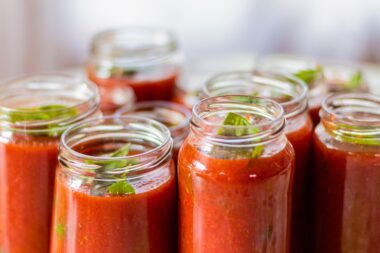Customizing Puppy Food Recipes by Breed and Age
Finding the ideal food for your puppy involves attention to both breed and age factors. Different breeds may have distinct nutritional requirements that need to be tailored accordingly. For instance, large breeds often require diets that promote healthy bone development, while smaller breeds thrive on nutrient-dense formulations. Similarly, age plays a critical role; puppies have different needs at various growth stages. Always consider your puppy’s breed when creating a recipe. Puppy food recipes must accommodate their specific growth rates and energy levels, most importantly in their formative months. Consulting with a veterinarian can help clarify your puppy’s needs. You can find guidance on the best ingredients to include for your pup’s size and breed. Researching ingredients online can help you find affordable sources that deliver the necessary nutrients, ensuring balanced meals that support their overall health. Looking for quality meat sources, fruits, and vegetables is essential. Planning balanced meals at home can result in healthier growth, leading to a more energetic puppy in the long run. Pay attention to details like portion sizes and nutritional ratios in your homemade recipes.
To create balanced meals, you should familiarize yourself with common ingredients that benefit puppies of all breeds. Some essential components include high-quality proteins, healthy fats, and carbohydrates. Proteins should come from sources like chicken, turkey, or beef, ensuring ample energy supply for active pups. In addition, healthy fats from fish oil or flaxseed oil contribute to skin health and a shiny coat. Carbohydrates can derive from brown rice or sweet potatoes as they are both excellent sources of energy. For optimal nutrition:
- Use lean meats for protein.
- Add fish oil for healthy fats.
- Include whole grains or veggies for carbs.
- Rotate ingredients periodically.
Rotating ingredients can help prevent feeding allergies or digestives issues. Don’t forget about vitamins and minerals; consider supplementing with calcium, phosphorus, or multivitamins for a complete balance. You can consult with your vet to identify any deficiencies. Always introduce new ingredients gradually to monitor for allergies and ensure your puppy’s digestive system adapts efficiently. Keeping a journal of what you feed helps track their reaction to particular foods.
Adjusting Recipes for Specific Breeds
When customizing recipes, understanding the distinctions between breeds helps significantly. For example, small breeds like Chihuahuas and Pomeranians require calorie-dense recipes. Their faster metabolisms mean that they need more calories to maintain weight. In contrast, large breeds like Great Danes require foods crafted to support slower growth rates. These puppies need a delicate balance of nutrients to prevent bone and joint problems later in life. Breeds like Bulldog and Boxer may benefit from added proteins and fewer carbohydrates to support their muscular build. When writing recipes for such breeds, ensure to include essential fatty acids and antioxidants. Popular ingredients may include:
- Chicken liver for protein.
- Blueberries for antioxidants.
- Carrots for fiber.
- Potatoes for energy.
Always incorporate a variety of textures and flavors to avoid boring meals for the puppy. A combination of recipes over time keeps feeding times engaging and nutritious. Therefore, developing meals that suit your puppy’s breed will promote a vibrant and energetic lifestyle.
Age is another crucial factor that impacts the recipe you make for your puppy. Young puppies, especially those under six months, require foods that assist with bone and muscle development. This usually means ingredient selection should include higher protein percentages and supplements like DHA for brain development. Homemade recipes for older puppies should focus on antioxidants and joint health. For puppies aged seven to twelve months, consider introducing whole grains and fiber-rich vegetables to aid digestion. Recipes should evolve just like your pup; they need adaptation as their nutritional needs change. Here is a basic guideline for stage-appropriate ingredients:
- Puppies (0-6 months): Protein-rich meals.
- Older Puppies (6-12 months): Grains and fiber.
- Adult Dogs (1 year+): Balanced meals.
Preparing meals to match their current needs ensures that your puppy transitions to their adult diet without issues. Always keep an eye on their energy levels and overall health to tailor the following meal plans.
Essential Vitamins and Minerals
When thinking about customizing puppy food, vitamins and minerals often get overlooked. However, they are vital for maintaining health and growth. Introducing natural sources can significantly enhance your puppy’s well-being. Vitamins like A, D, E, and K are essential to support vision, bone growth, skin health, and immune functions. Some valuable sources for vitamins include:
- Carrots and spinach for Vitamin A.
- Egg yolk for Vitamin D.
- Fish oil for Vitamin E.
These ingredients can easily be incorporated into homemade recipes. Additionally, incorporating minerals like calcium, phosphorus, and magnesium promotes healthy growth for your developing puppy. Supplements can also be beneficial for their diets, but using natural sources is often advisable. Be cautious with amounts to prevent deficiencies or toxicities. Monitoring their weight and health can signal whether nutritional adjustments are necessary. Keep a consistent feeding schedule, ensuring your meals provide comprehensive nutrition. This commitment leads to happier, healthier puppies that grow into obedient companions.
Preparing homemade puppy food has several advantages beyond essential nutrition. Control over ingredients ensures you track your puppy’s dietary intake closely. This aspect can help identify any possible allergies or intolerances promptly. It allows you to pick high-quality proteins and limit fillers like corn or artificial additives. Additionally, you can adapt recipes based on any seasonal vegetables or local produce, promoting sustainable feeding choices. Using seasonal produce reduces costs and benefits the environment. Budget-friendly ingredients can make homemade food more accessible for pet owners, ensuring your puppy receives quality meals regardless of budget restrictions. However, meal prep requires time and commitment, but reminders to batch-prepare can ease the process. Establishing a routine when preparing your puppy’s food can make it a fun family activity, involving every member of the household. Homemade meals foster strong bonds and meaningful engagement with our furry companions. Always use clean utensils and avoid cross-contamination. This care ensures that your puppy remains safe and healthy, making your effort in creating homemade food worthwhile because of significant health benefits.
Innovative Recipe Ideas
Once you comprehend your puppy’s specific requirements, introducing innovative recipes becomes enjoyable. A simple, versatile recipe could include brown rice, chicken, carrots, and peas. Start by cooking the rice according to package instructions. In parallel, boil chicken until fully cooked, and cut it into small, puppy-sized pieces. Meanwhile, steam the carrots and peas until tender, then combine them all together. To spice this meal up, consider adding herbs like parsley or turmeric for their health benefits. Add one teaspoon of fish oil for a dose of healthy fats. This recipe is not only nutritious but also creates a pleasant meal for your puppy. You can modify this based on their preferences by introducing other ingredients like sweet potatoes or pumpkin. Mixing different recipes fosters variety while ensuring nutritional completeness. Furthermore, considering raw or dehydrated food options gives you flexibility. Experimenting continually will positively influence your puppy’s acceptance of various foods and textures. Customizing meals for your pup should be an exciting experience as it promotes health and bonding through shared feeding times.
In conclusion, customizing puppy food recipes by breed and age plays a crucial role in ensuring optimal health and growth. Understanding each dog’s unique needs is imperative for tailoring diets that align with their lifestyle. By focusing on protein sources, quality fats, and incorporating essential vitamins, you foster healthy development. Homemade recipes allow you to maintain control over ingredients, ensuring balanced nutrition tailored for every puppy’s requirements. Monitoring your pup’s health throughout their growth stages is essential, making dietary adjustments as needed. Investing time in meal preparation pays off in your puppy’s vitality, energy levels, and overall well-being. Always remain prepared to research new ingredients and adapt as your puppy matures. Facilitating diversity in their meals can help prevent boredom and promote acceptance of various foods. Ultimately, caring for your puppy’s dietary needs creates a lasting bond that enriches your relationship. It’s rewarding to see them thrive while enjoying their home-cooked meals. By continually learning about their nutritional needs, you’ll ensure they have a long, healthy life ahead. Each meal can become a moment of joy for both you and your beloved furry companion. Playfully customizing recipes ensures a fulfilling and healthy puppy parenting journey.





